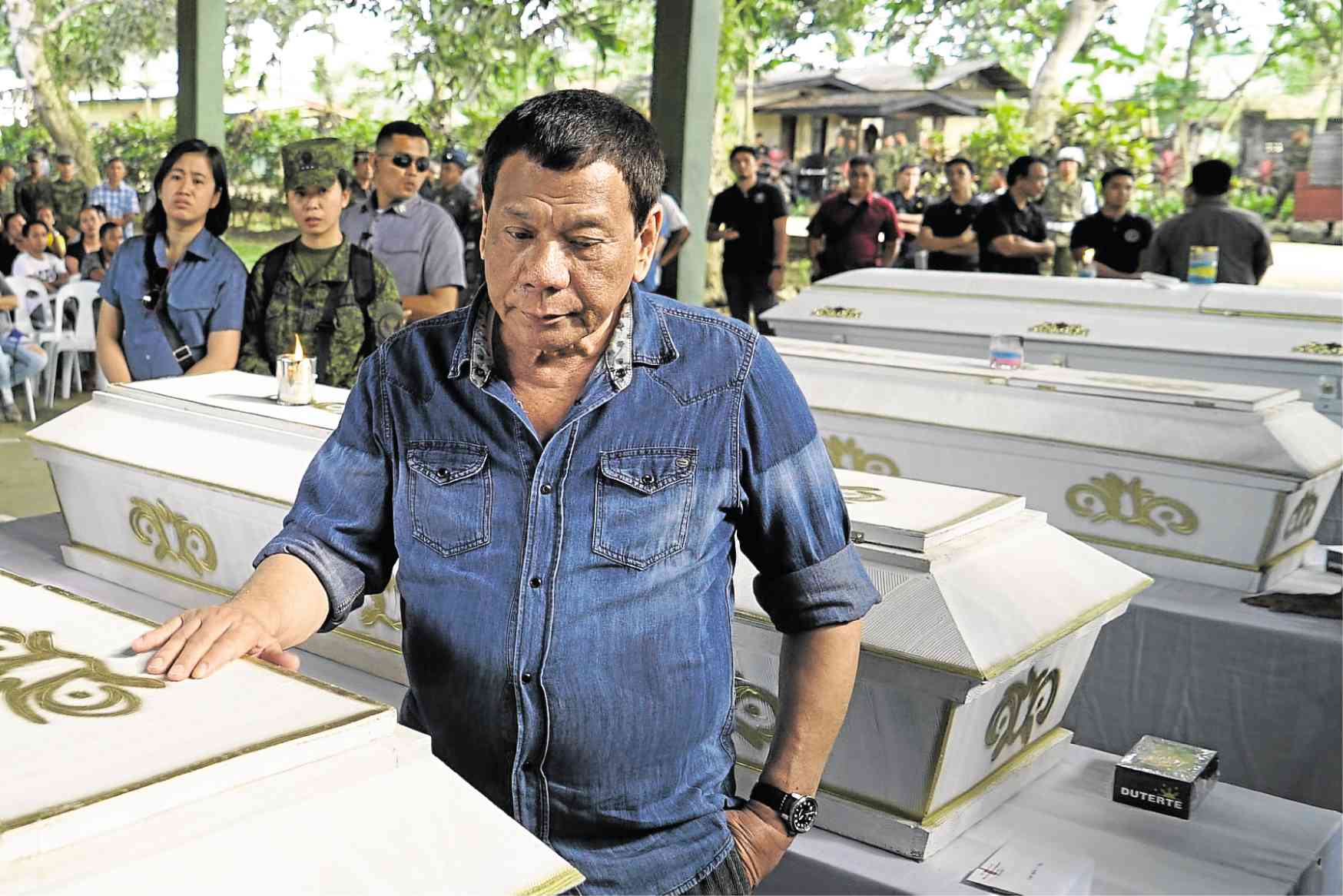Jolo Mayor Tan fears whitewash in probe of twin blasts

BODY COUNT Arriving in Jolo, Sulu province, on Jan. 28 to condole with the families who lost loved ones in the bombing of the Our Lady of Mount Carmel Cathedral, President Duterte has ordered an all-out war on the Abu Sayyaf, which allegedly aided an Indonesian couple on a suicide mission to carry out the attack. —MALACAÑANG PHOTO
The National Bureau of Investigation is conducting its own probe of the deadly bomb attack on a Catholic church in Jolo, Sulu province, and a small mosque in Zamboanga City, Justice Secretary Menardo Guevarra said on Saturday.
Guevarra ordered the investigation a day after Jolo Mayor Kherkar Tan reiterated his call for an independent investigation by human rights groups while expressing doubts about the government security measures before the blasts.
“The NBI is investigating all possible angles. The NBI will also include the bombing of the mosque [because] there might be a connection,” Guevarra said in a statement.
He said investigators in Jolo were hampered by the state of the preservation of the crime scene.
“Our field operatives are encountering some difficulty because so many people have come in and out of the cathedral and may have accidentally moved the physical evidence,”Guevarra said.
Mayor airs appeal
The twin explosions at the Our Lady of Mount Carmel Cathedral in Jolo on Jan. 27 killed 22 people and left more than 100 others wounded.
Two days later, a grenade was lobbed into the mosque at Barangay Talon-Talon in Zamboanga City, killing two Islamic preachers, wounding four others, and fanning speculation that the attack was in retaliation for the church bombing.
In an interview with the Inquirer, Tan appealed to local and international human rights groups to come to Jolo and investigate the church bombings.
“I am asking human rights groups to come here, do an independent factfinding. I fear this bombing might end up being whitewashed,” Tan said.
Residents as well as the families of the victims who either died or were wounded in the twin blasts refused to believe claims by President Rodrigo Duterte and other government officials that Indonesian suicide bombers may have carried out the attack.
‘Tightly secured’
Instead, they wanted security forces to answer why the bomber was able to get inside the cordoned-off area and evade the tight security implemented around the cathedral as early as seven months ago.
“The church [was] tightly secured, very secured. Troops [frisked and inspected the belongings of] every person trying to get into the premises, we are not that stupid to buy this (suicide bomber) theory,” said Eugene Non, a son of Fe Non, who died in the blast on the day he celebrated his birthday.
Based on the security plan of the Metro Jolo Inter-Agency Task Group, the cathedral, including the Notre Dame building, and the office of the Apostolic Vicariate of Jolo, had been cordoned off as early as August last year.
Roadblocks and checkpoints manned by soldiers of the Army’s 35th Infantry Battalion were erected on five roads—General Arulas Street, Buyon Street, Travesia Road, Sanchez Road and Muralla Road—which lead to the two church structures.
Other people interviewed by the Inquirer could not understand how government security forces in the cordoned-off section, called Walled City, failed to detect the bombs or apprehend their carriers.
“For six to seven months, the church had been highly secured, soldiers had kept people out and people were not allowed even to touch the cordon,” said Fr. Romeo Saniel, OMI, apostolic administrator of the Jolo vicariate.
Saniel called for justice for the victims and for security forces to be made accountable.
‘A big question’
Tan said it was “a big question to all of us here” why a bomb got through. “No vehicle was allowed to pass in front of the cathedral. No vehicle, not even a motorbike, was allowed to park nearby,” he said.
Arthur de los Reyes, whose wife Daisy also died in the blast, said even getting inside the cathedral was difficult.
“Our bags, even our small items, were thoroughly inspected, so [we cannot accept] these recent reports that a man and woman were able to get inside with a backpack. How?” he said.
“There were security lapses,” he said. “We want them to be accountable for that. I lost my wife. I and my daughter, Angel, are still nursing our wounds [from the blast],” De los Reyes said.
Ridzmar Mukadil, the only Muslim killed in the attack, was the sole breadwinner of his family in Barangay Godinez. A shoe repairman, he was also the only person allowed to stay outside the cathedral every Sunday.
But although family members already accepted his death, they also wanted to know why the explosions took place in the tightly secured area.
Ghost town at 8 p.m.
The hut where Mukadil lived was covered with posters which read, “Yes to Bangsamoro Organic Law.”
Midz Asirin, a pedicab driver, said the road to the cathedral was opened to the public only on Sundays.
“It was opened in one direction only. You could not pass through if you did not have an ID),” he said.
Before the bombing and despite the threats, Tan said Jolo’s economy flourished.
“Life here was so alive despite the imposition of martial law. But now, at 8 p.m., Jolo looks like a ghost town,” he said.
Everything under control
Senior Supt. Pablo Labra II, police director of Sulu, said security forces had imposed a lockdown around the cathedral because of previous bomb threats.
“But incidents like bombing happened. It doesn’t mean we are remiss (in our duty) or there had been negligence in securing the place. What we do, we just focus on our work,” Labra said.
Col. Gerald Monfort, spokesperson for the Army’s 11th Infantry Division, denied rumors that residents were at risk of being shot and killed by security forces if they were found outside their homes after 9 p.m.